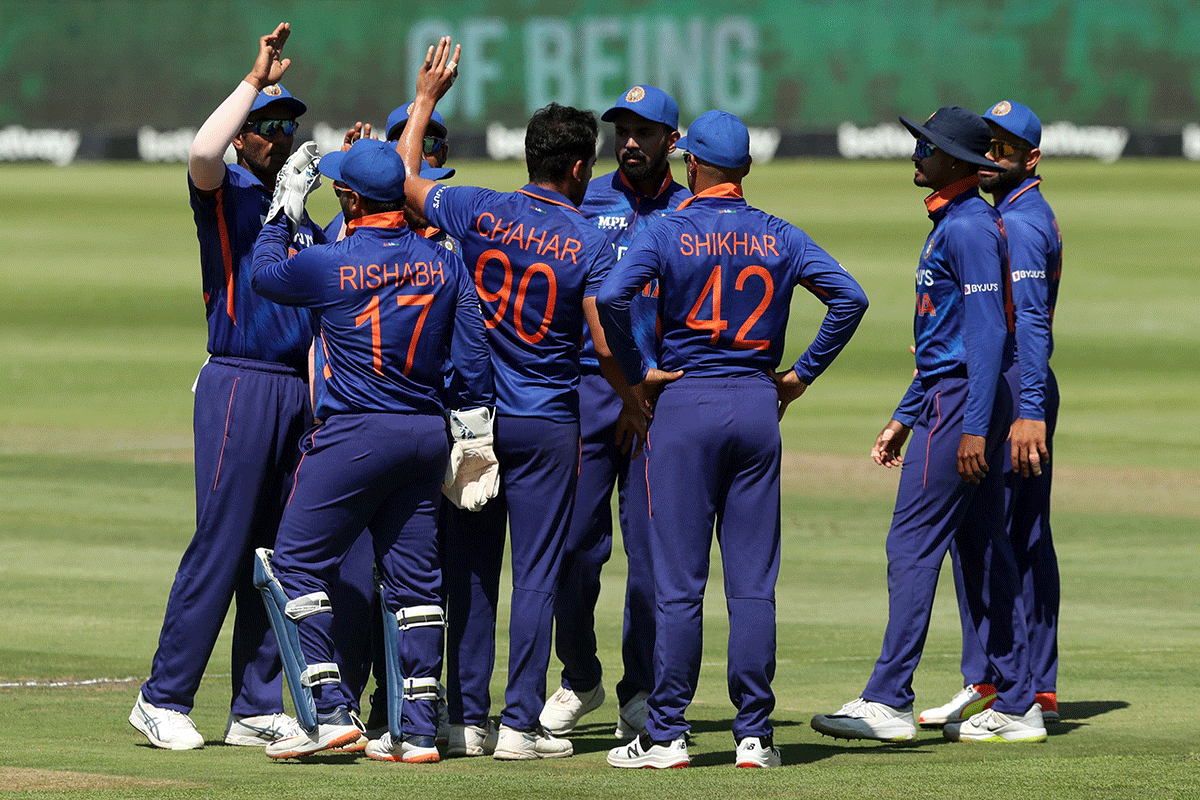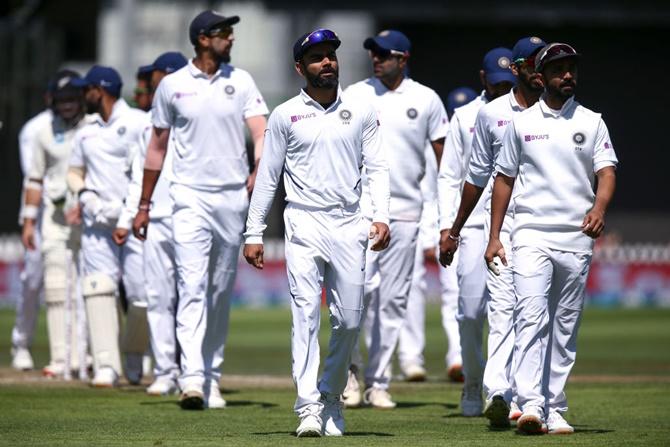 | « Back to article | Print this article |
Why does Indian cricket find itself on a slippery slope?, Indrajit Gupta asks.

The ignominy of losing the Test series and the one-day internationals in South Africa has jolted every Indian cricket fan.
It is hard to remember the last time India was beaten by a lower rated team on five consecutive occasions.
While that should give the mandarins at the Board of Control for Cricket in India enough reason to be concerned, there is no official word from the powers-that-be or the selection committee so far.
Even Coach Rahul Dravid has remained unusually quiet about the setbacks.
Much of the focus, however, has been on the awkward and abrupt leadership transition in Indian cricket.
It is entirely possible that the captaincy transition did impact the team's self-belief and create uncertainty in the mind of the players.
However, we place too much undue importance on the role of the captain in cricket.
And Virat Kohli epitomised our collective obsession with a larger-than-life leader.
And it isn't as if Rohit Sharma's return as captain will somehow miraculously reverse this losing streak.
What this debate does is that it takes the attention away from the more pressing challenges facing Indian cricket.
Now, here's the moot point about the current crisis: It can't be about raw talent.
India has easily the best bench strength in the world.
And it has an administration that is flushed with cash.
It has all that it takes to invest and develop the best cricketing talent and a supporting infrastructure.
So why isn't the team able to perform? On this tour, every commentator blamed it on listless performance, poor application at the crease and not being able to capitalise on the key moments.
In her book Confidence, Harvard professor Rosabeth Moss Kanter asks a fundamental question: Is success simply a matter of money and talent? Or is there another reason why some people and organisations always land on their feet, while others, equally talented, stumble again and again?
This is true for every aspect of life, be it sports or business.
Now, why does Indian cricket find itself on a slippery slope? Consider a set of inter-related issues.

To begin with, the pernicious impact that the Indian Premier League and the T-20 format has on the game.
The IPL is the BCCI's golden goose.
The riches it brings in gives its untrammelled power in world cricket.
No international board will ever question the BCCI as long as it receives a share of the gravy train.
And the IPL is all set to become even bigger this year.
The last time, the broadcasting and digital streaming rights for the IPL were auctioned, it went to Star Sports for a whopping Rs 16,347 crore (Rs 163.47 billion) for five years.
In the new cycle, there's talk that the bidding among the broadcasters and digital media platforms might double the value and even hit Rs 40,000 crore (Rs 400 billion).
That'll be perhaps many times more than the combined budgets of all the cricket boards around the world put together.
There's a belief that the IPL helps discover grassroots talent -- and that's true -- but the T-20 game is largely about brute force, rather than technique, application and temperament.
If lusty sixes can do the job, why bat patiently and build the innings, Sunny Gavaskar style? Entertaining audiences now wins over quality.
What's more, the BCCI has now extended the IPL to almost two months in its cricketing calendar from this year. After all, money rules!
This get-rich-quick formula is also playing truant with player psychology and technique.
If India's abysmal and abject surrender in South Africa is any evidence, making the shift from the longer format to white ball cricket is far from easy.
In fact, Sir Ian Botham has also attributed England's dismal performance at the Ashes to too much white ball cricket.
And as a first step, Joe Root, Ben Stokes and Jofra Archer have now pulled out of the IPL to focus on county cricket.
It is easy to recommend separate teams for Tests and white ball cricket.
But soon, it will be hard to find players that respect the way the game was played in the past.
Young talent will take their cues from what they observe. We are at that inflexion point. And spectacular batting collapses will be a common occurrence.
Even a great coach like Dravid will struggle to instil resilience and temperament in the side.
Besides, a packed calendar -- plus the added pressure of playing in a bio-bubble -- will lead to stress, burnouts and more bowler injuries.
Stories abound of players buying a multi-million dollar bungalow or a fancy new car.
No one should grudge them their fair share of material success.
But former players also point towards an aspect of the game that's changing: A reduced hunger for success.
In the eighties, Mohinder Amarnath epitomised this indomitable spirit.
He trained hard, never gave away his wicket easily and always placed a premium on wearing the India cap.
It is hard to find gutsy players like him. Dravid was one such.
But now, he has his task cut out to build a new generation of players in his own mould. I'm willing to bet it won't be easy.
Slowly but surely, the game of cricket is changing character.
Just that we are unwilling to see the writing on the wall.
Indrajit Gupta is co-founder at Founding Fuel.
Feature Presentation: Aslam Hunani/Rediff.com